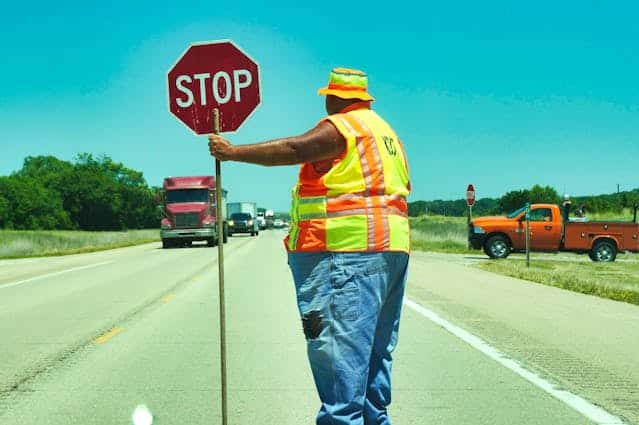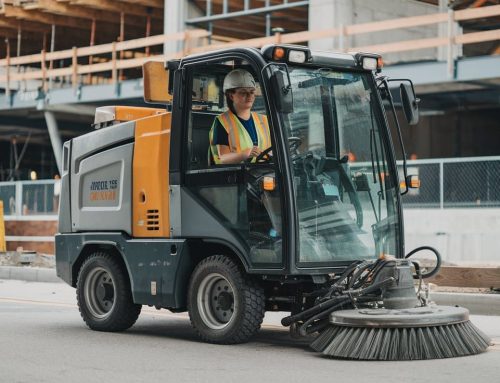The New York City Comptroller’s office has recently updated its prevailing wage schedules, introducing a separate category for flaggers for the first time. While the New York State Department of Labor and federal Davis-Bacon schedules already listed flagmen under the “Laborer” trade classification, the New York City Comptroller’s schedules did not. This new development has implications for both flaggers and employers and will help ensure fair compensation and recognition of the critical role these workers play in maintaining safety on construction sites.
Importantly, these wage rates apply to all flaggers. Under previous New York City law, only flaggers who performed “safety flagging” were eligible for prevailing wages but “traffic control” work was not eligible. The new schedules do away with this distinction and provide for prevailing wages for all flaggers.
Background on Prevailing Wage Schedules
Prevailing wage schedules set the minimum pay rates and benefits for workers on public works projects. These schedules ensure workers receive fair compensation for their labor on government-funded construction projects.
Flaggers’ Vital Role
The work performed by Flaggers on a construction project broadly falls into two categories, safety flagging and traffic control. Through both duties, they ensure safety on construction sites and roadways. Their responsibilities can include:
- Directing traffic around construction zones
- Ensuring the safety of workers and pedestrians
- Communicating with drivers and construction crews
- Managing traffic flow in work areas
- Directing construction vehicles, such as trucks, excavators, and more
- Setting up and moving construction barriers
Implications for Employers and Workers
This classification has important implications:
- Increased Wages: While many flaggers were already entitled to prevailing wage pay rates, it could be confusing to determine who was entitled to prevailing wages. Now that all flaggers are entitled to prevailing wage rates that are officially designated in the prevailing wage schedules for New York City, there is more clarity around required wage rates.
- Enhanced Benefits: Along with wages, the prevailing wage schedules include provisions for benefits, which will improve overall compensation packages for flaggers. If benefits are not provided, then they must be paid on an hourly basis.
- Improved Working Conditions: Recognition of the wage schedules will pave the way to better working conditions and increased job security for flaggers.
- Compliance Requirements: Employers on public works projects must ensure they are paying flaggers according to prevailing wage rates.
Legal Considerations for Employers
Employers in the construction industry should be aware of the following:
- Review and Update Payroll Practices: Ensure that flaggers are compensated according to the updated prevailing wage schedules.
- Contract Adjustments: New contracts may need to be reviewed and adjusted to account for the new wage requirements.
- Documentation: Maintain accurate records of wages paid and hours worked to demonstrate compliance with the new schedules.
- Training: Educate supervisors and payroll staff about the new classification and its requirements.
Resources for Further Information
For those seeking more information on this topic, the following resources may be helpful:
- NYC Comptroller’s Prevailing Wage Memorandum Regarding Flag Persons: This document explains the requirement that flaggers are subject to the prevailing wage requirements of Article 8, Section 220 of the Labor Law as “laborers, workmen, or mechanics” and that the Prevailing Rate of Wages and Supplements applies to them.
- NYC Comptroller’s Office Website: The official source for prevailing wage schedules and related information.
- New York State Department of Labor: Offers additional context on prevailing wage laws and enforcement.
- New York Prevailing Wage Attorney Consultation: Our team of experienced professionals will be happy to give you a free consultation to help you understand your rights. We only get paid if you collect on your wage claim.
Additional Implications
While the direct impact is limited to New York City, this development underscores a growing trend toward recognizing and fairly compensating essential workers in the construction industry. New York City’s decision to explicitly include flaggers in prevailing wage schedules may inspire other cities and states to follow suit and consider similar updates.
Conclusion
Including a separate category of flaggers in the NYC Comptroller’s prevailing wage schedules represents a significant step forward in recognizing their importance to construction crews. Employers and workers should familiarize themselves with these updates to ensure compliance and fair compensation. If you think you’re owed wages as a flagger for working on a public works project in New York and have yet to be paid the prevailing wage, contact our team of New York prevailing wage attorneys. We help employees fight for their workplace rights.











Leave A Comment